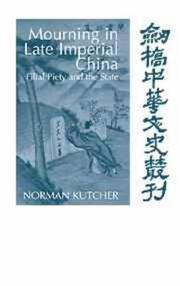| Listing 1 - 4 of 4 |
Sort by
|

ISBN: 0521624398 0521030188 0511572743 Year: 1999 Publisher: Cambridge : Cambridge University Press,
Abstract | Keywords | Export | Availability | Bookmark
 Loading...
Loading...Choose an application
- Reference Manager
- EndNote
- RefWorks (Direct export to RefWorks)
As a conquest dynasty, Qing China's new Manchu leaders desperately needed to legitimize their rule. To win the approval of China's native elites, they developed an ambitious plan to return Confucianism to civil society. Filial piety, the core Confucian value, would once again be upheld by the state, and laborious and time-consuming mourning rituals, the touchstones of a well-ordered Confucian society, would be observed by officials throughout the empire. In this way, the emperor would be following the ancient dictate that he 'govern all-under-heaven with filial piety'. Norman Kutcher's study of mourning looks beneath the rhetoric to demonstrate how the state - unwilling to make the sacrifices that a genuine commitment to proper mourning demanded - quietly but forcefully undermined, not reinvigorated, the Confucian mourning system. With acute sensitivity to language and its changing meanings, Kutcher sheds light on a wide variety of issues that are of interest to historians of late Imperial China.
Mourning customs --- Funeral rites and ceremonies --- Filial piety --- Deuil --- Funérailles --- Piété filiale --- Coutumes --- Rites et cérémonies --- China --- Chine --- Social life and customs --- Moeurs et coutumes --- S13A/0410 --- -Funeral rites and ceremonies --- -Mourning customs --- -Manners and customs --- Rites and ceremonies --- Funerals --- Mortuary ceremonies --- Obsequies --- Manners and customs --- Burial --- Cremation --- Dead --- Filial love --- Piety, Filial --- Conduct of life --- Parent and child --- Piety --- China: Religion--Death, funeral, ancestral worship --- -Filial piety --- -China: Religion--Death, funeral, ancestral worship --- -S13A/0410 --- -Funerals --- Funérailles --- Piété filiale --- Rites et cérémonies --- Cina --- Kinë --- Cathay --- Chinese National Government --- Chung-kuo kuo min cheng fu --- Republic of China (1912-1949) --- Kuo min cheng fu (China : 1912-1949) --- Chung-hua min kuo (1912-1949) --- Kina (China) --- National Government (1912-1949) --- China (Republic : 1912-1949) --- People's Republic of China --- Chinese People's Republic --- Chung-hua jen min kung ho kuo --- Central People's Government of Communist China --- Chung yang jen min cheng fu --- Chung-hua chung yang jen min kung ho kuo --- Central Government of the People's Republic of China --- Zhonghua Renmin Gongheguo --- Zhong hua ren min gong he guo --- Kitaĭskai︠a︡ Narodnai︠a︡ Respublika --- Činská lidová republika --- RRT --- Republik Rakjat Tiongkok --- KNR --- Kytaĭsʹka Narodna Respublika --- Jumhūriyat al-Ṣīn al-Shaʻbīyah --- RRC --- Kitaĭ --- Kínai Népköztársaság --- Chūka Jinmin Kyōwakoku --- Erets Sin --- Sin --- Sāthāranarat Prachāchon Čhīn --- P.R. China --- PR China --- Chung-kuo --- Zhongguo --- Zhonghuaminguo (1912-1949) --- Zhong guo --- République Populaire de Chine --- República Popular China --- Catay --- VR China --- VRChina --- 中國 --- 中国 --- 中华人民共和国 --- Jhongguó --- Bu̇gu̇de Nayiramdaxu Dundadu Arad Ulus --- Bu̇gu̇de Nayiramdaqu Dumdadu Arad Ulus --- Bu̇gd Naĭramdakh Dundad Ard Uls --- Khi︠a︡tad --- Kitad --- Dumdadu Ulus --- Dumdad Uls --- Думдад Улс --- Kitajska --- Arts and Humanities --- History
Book
ISBN: 9780520297524 Year: 2018 Publisher: Oakland University of California Press
Abstract | Keywords | Export | Availability | Bookmark
 Loading...
Loading...Choose an application
- Reference Manager
- EndNote
- RefWorks (Direct export to RefWorks)
"This book offers a new understanding of eunuchs and their connection to imperial rule in early-to- mid-Qing China (1644-1800). Historians have traditionally viewed this period as one in which China's greatest emperors crafted policies that curtailed eunuch power, following its surge in the Ming dynasty (1368-1644). Using archival, epigraphic, and other newly available sources, Norman Kutcher demonstrates the continuing influence and even empowerment of eunuchs throughout this period. The book traces this empowerment to eunuchs' exploitation of the gap between imperial rhetoric and practice and to their networking and other collective action in and beyond the city of Beijing"--Provided by publisher.
Book
Year: 1991 Publisher: Ann Arbor UMI
Abstract | Keywords | Export | Availability | Bookmark
 Loading...
Loading...Choose an application
- Reference Manager
- EndNote
- RefWorks (Direct export to RefWorks)
Book
ISBN: 0520969847 9780520969841 9780520297524 Year: 2018 Publisher: Oakland, California
Abstract | Keywords | Export | Availability | Bookmark
 Loading...
Loading...Choose an application
- Reference Manager
- EndNote
- RefWorks (Direct export to RefWorks)
"This book offers a new understanding of eunuchs and their connection to imperial rule in early-to- mid-Qing China (1644-1800). Historians have traditionally viewed this period as one in which China's greatest emperors crafted policies that curtailed eunuch power, following its surge in the Ming dynasty (1368-1644). Using archival, epigraphic, and other newly available sources, Norman Kutcher demonstrates the continuing influence and even empowerment of eunuchs throughout this period. The book traces this empowerment to eunuchs' exploitation of the gap between imperial rhetoric and practice and to their networking and other collective action in and beyond the city of Beijing"--Provided by publisher.
Eunuchs --- History. --- China --- History --- Kings and rulers. --- 1644 to 1800. --- betrayal. --- china. --- chinese history. --- cultural subversion. --- dramas. --- emperors. --- eunuchs. --- faithfully serving. --- fallen ming dynasty. --- fascinating perspective. --- government institution. --- great eunuch corruption. --- history of china. --- imperial rule. --- late imperial china. --- learning about eunuchs. --- modern china. --- palace world. --- qing dynasty.
| Listing 1 - 4 of 4 |
Sort by
|

 Search
Search Feedback
Feedback About UniCat
About UniCat  Help
Help News
News